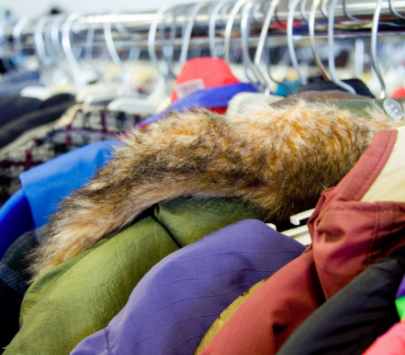Fast fashion: trendy or destructive?

PHOTO BY LANCE MCCORD OBTAINED THROUGH CREATIVE COMMONS
Thrift stores such as the Kitty Hawk in North Carolina are low- cost alternatives to buying fast fashion.
January 20, 2021
It takes as much water to make a single cotton t-shirt as it does for a person to drink for 900 days, according to the World Wide Fund for Nature. Rivers in China, India and Bangladesh are now polluted with cancer-causing chemicals due to wastewater from factories.
The topic of fast fashion is a controversial one, as it offers accessibility and low pricing despite causing many environmental problems.
The fast fashion industry is doing considerable damage to the environment. Fast fashion is clothing made for the purpose of short-term trends rather than quality or sustainability. While the negative environmental effects are evident, fast fashion has flourished over the past few years and writers at GlobeNewswire predict that it will continue to do so.
Sustainable fashion items may be better for the environment, but there are some advantages to fast fashion that keep customers coming back. Styles and preferences change over time. Sustainable fashion is made to last, but sometimes change can be good. Buying a few more expensive pieces to wear for years to come can quickly become boring for some.
Most adults do not wear the same clothes they wore in middle or high school. Even if their size has not changed, their clothing style most likely did. One of the main reasons fast fashion is so popular is because opinions on clothing constantly change. For some, buying sustainable fashion clothing would result in buying new clothes in a similar amount of time to a fast fashion buyer, but it would cost more money.
Sophomore Anna Siciliano of Ocean Township believes fast fashion is not bad in moderation and appreciates the fact that trends can be used to connect people.
“You do waste a little bit of money, but it’s not like you’re wasting a lot of money because it’s small things,” Siciliano said. “Plus, you want to fit in with everybody so it’s kind of cool [in that way].”
Siciliano also brought up that fast fashion items are not necessarily thrown away so quickly. “Scrunchies blew up like a year or two ago,” Siciliano said. “I still have scrunchies and I have one in my hair right now.”
Fast fashion stores like Gap and Forever 21 are also known for being more accessible and having lower prices. This can outweigh the negative effects of buying fast fashion for some.
Despite fast fashion’s increasing popularity, those willing and with the right resources are choosing not to follow the crowd. Sustainable fashion and thrifting are environmentally friendly alternatives to fast fashion. Sustainable or slow fashion brands keep the environment in mind by producing clothing that is high enough in quality to last a long time. However, as shopping slow fashion is more expensive, it is not an option for everyone.
Sophomore Mary Jodry of Neptune City is a supporter of sustainable fashion.
“I think the whole idea of fast fashion is just damaging,” Jodry said. “More than half my closet is thrifted stuff.”
At the slow fashion brand Study NY, they use slower production schedules so products are not made hastily, pay their employees fair wages and maintain lower carbon footprints. To reduce their carbon footprint, sustainable fashion brands like Study NY make higher quality clothing to extend the life of each garment and reduce the amount of clothing in landfills.
Actress Emma Watson is just one of many people advocating for ethical fashion.
In an interview with digital publisher Coveteur, Watson said, “People forget about vintage and second-hand clothes a lot, they forget about buying things that are more durable, or shopping a bit less.”
This idea is something Watson lives by in her personal life. Her entire wardrobe is environment-conscious from gowns to sneakers.
CHS Senior Melody Lin of Freehold says she tries to support ethical fashion and avoid fast fashion.
“I am definitely against fast fashion. I think that it is terrible for the environment and the people who go into making it,” Lin said. “I can’t remember the last time I went into a store with fast fashion.”
Sophomore Mindy Preston of Howell had a more neutral approach, feeling that fast fashion is unhealthy for the environment, but admitting to owning some fast fashion items.
“Half of my clothes are hand-me-downs, so I keep my clothes for a very long time. I probably own [fast fashion], but I also didn’t make the conscious decision to buy it.”
While fast fashion companies are known for their lower prices, trendy styles and accessibility, their methods are damaging to the planet. For those who can afford it, long-lasting classic items from ethical fashion brands are worth the investment.



